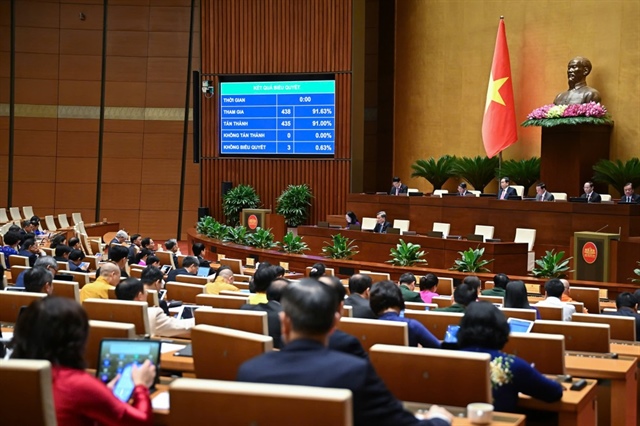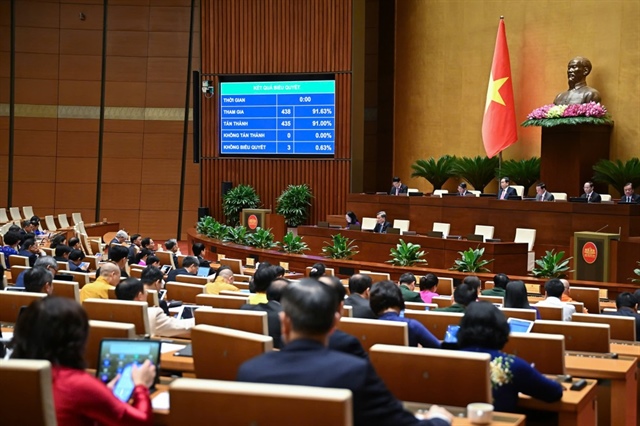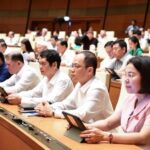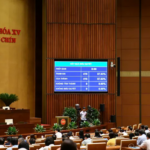On June 27th, with the majority of delegates voting in approval, the National Assembly passed the amended Law on Science, Technology, and Innovation. The Law consists of 73 articles and will take effect on October 1st, 2025.
Notably, regarding risk acceptance, the passed Law stipulates that organizations and individuals conducting scientific research, technological development, and innovation are exempt from administrative liability and civil liability for damages caused to the State.
This provision applies if they have fully complied with the procedures and regulations during the implementation of scientific research, technological development, and innovation, and there is no fraud, intentional violation of the law, or misuse of objectives and budget scope.

The amended Law on Science, Technology, and Innovation, which took effect on October 1st, 2025. Photo: QH |
Organizations implementing scientific, technological, and innovation tasks using state budget funds, legitimate funds of public non-business units, or funds of state-owned enterprises are not required to refund the funds if they have been used for the right objectives and scope. The condition is that the involved individuals have fully complied with the regulations on task management, implementation procedures, research content, and risk prevention measures, even if the task’s results do not meet the set goals.
Organizations and individuals who approve and manage scientific, technological, and innovation tasks using the state budget, legitimate funds of public non-business units, or funds of state-owned enterprises are exempt from administrative liability and civil liability. This applies when they have fully adhered to the regulations and procedures for approval and management of tasks and have not committed any legal violations, even if the task’s results do not meet the set goals.
Significantly, the Law stipulates the exclusion of criminal liability according to the provisions of the Penal Code for risks in research, testing, and application of scientific and technological advances.
The National Assembly has entrusted the Government to detail this article, set criteria for identifying acceptable risks, and outline the process for evaluating compliance with procedures and regulations in approving, managing, and conducting scientific research, technological development, and innovation.
During the discussions, some delegates suggested the need to clarify the term “免责责任法律” (“exemption from legal liability”). They argued that only by “免责刑事责任” (“exempting criminal liability”) can scientific research, especially basic research, be effectively promoted.
The Standing Committee of the National Assembly believed that the provisions on exemption from liability in risk acceptance should be carefully considered to minimize policy exploitation during the research implementation process. The Committee aimed to prevent the legitimization of wrongdoing and the limitations of capacity and organization in conducting research, which could lead to unsatisfactory outcomes. Therefore, the Law authorizes the Government to issue specific regulations to avoid such situations.
Article 9 of the draft Law only exempts liability for damages caused to the State and those related to the state budget and funds of state-owned enterprises. For damages caused to citizens, the organization or individual causing the harm will be liable for compensation according to civil law provisions and may be subject to administrative or criminal penalties depending on the nature and severity of the case.
Regarding harmony with criminal law, some provisions on criminal liability exemption for applying “new business models” will be incorporated into the amended Penal Code concerning risks in research, testing, and applying scientific and technological advances and new business models.
|
Developing National Key Laboratories The Law also emphasizes that the State prioritizes investing in the development of infrastructure for scientific research, technological development, and innovation; establishing national key laboratories; and promoting connectivity between research institutes, universities, and enterprises. Notably, the Law stipulates investing in the development of universities into centers for scientific research, technological development, and innovation; gradually forming high-level research centers associated with high-quality human resource training, ensuring effective coordination with the network of specialized research institutes. The Law regulates that scientific, technological, and innovation tasks can be implemented with full funding for the final product or partial funding for specific research content. The hosting organization can use labor funds to hire domestic and foreign experts through agreements, taking responsibility for using the funds for the right purposes, storing vouchers, and providing explanations when requested. |
REPORTER GROUP
– 09:03 27/06/2025
“Legislature Agrees to Extend Agricultural Land Tax Exemption Until 2030”
“In a unanimous decision, an overwhelming majority of 443 out of 444 attending delegates of the National Assembly voted to pass a resolution on agricultural land-use tax exemption on the afternoon of June 26th.”
“Renowned Speaker of Parliament, Tran Thanh Man, Elected as Chairman of the National Election Council”
On June 25th, the legislative body embarked on a significant journey, with a key focus on personnel matters that fell within its purview.





















